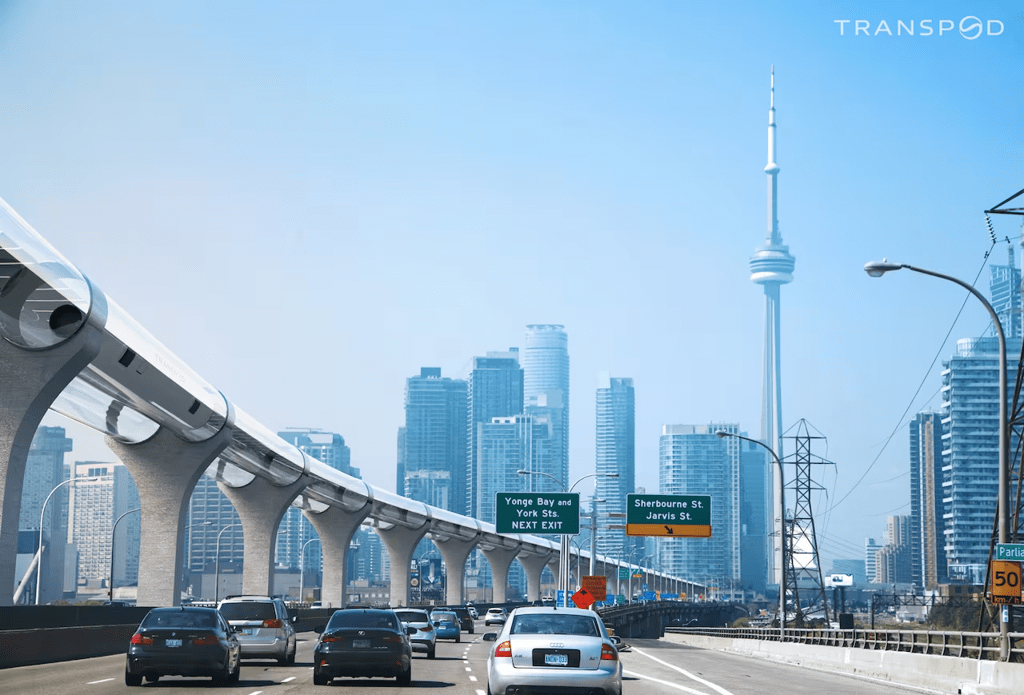Five-hour drives from Toronto to Montreal could be shortened to less than an hour by high-speed rail, says a new Canadian high-speed rail company.
Toronto-based startup company TransPod says 1,000 km/h levitating trains could be a reality in Canada by the 2030s.
The TransPod system is “built like a plane, but operates like a train,” said Dr. Ryan Janzen, co-founder of TransPod, last December in Toronto — complete with a nose, tail and fuselage. At top speed, the startup’s levitating trains could theoretically reach speeds over 1,000 km/h.
The fastest commuter rail in the world right now is in China and can reach speeds up to 600 km/h.
Janzen hopes to bring train travel back to Canada and make it the fastest, most environmentally friendly mode of transportation available. TransPod is currently looking to install networks from Toronto–Montreal and Edmonton–Calgary.
The TransPod system would be able to transport people by rail faster than some Canadian airlines to domestic airports but with significantly cleaner energy since the trains run on electricity instead of diesel.
The secret to TransPod’s high-speed trains is plasma technology. The fastest high-speed rail networks outside of Canada utilize maglev trains to keep the trains floating above the tracks, reducing the effects of friction. TransPod hopes to adopt a new technology utilizing polarized plasma streams which act as virtual wires between the trains and the tracks to effectively remove friction from the equation altogether.
The startup company is looking for contracts to make the TransPod system a reality by the 2030s. Though TransPod’s plan is very ambitious, it is by no means an original idea when it comes to railway travel in Canada.
Since 1970, there have been 26 studies into the idea of installing a high-speed rail network in Ontario and none have been implemented.
The latest study, conducted in 2023, found that a high-speed rail network connecting Toronto–Quebec City and passing through Ottawa and Montreal would be financially sustainable with an estimated $10 billion budget and an annual operating cost of $189 million. At breakeven costs, a ticket from Toronto–Montreal would cost an estimated $46. Compare this to current nonstop flight costs from Toronto–Montreal which start at $316.
The 2023 study also makes clear that it is most important to “do it now rather than building a lower speed network that will be later upgraded to high-speed rail.” The only time better than now to build a high-speed rail network in Canada is yesterday.
Canada remains the only country in the G7 to not have any high-speed trains.
There has been a lot of discourse about installing a high-speed rail network along the Quebec City–Windsor corridor. The corridor is the most densely populated region in Canada and contains three metropolitan areas and 16 other major cities with over 100,000 residents — including the Niagara municipal region — nearly all of which are in a virtual straight line.
It is sheer insanity that there has been no serious undertaking to install a high-speed train network along the corridor, considering over half of Canada’s population — 94 per cent of Ontario’s population and 65 per cent of Quebec’s population — live within the corridor.
What has been made clear time and time again is that neither the federal nor provincial government are able or willing to refocus transportation away from our four-lane highways and reinvest in a national rail network.
What gives hope of TransPod breaking the cycle is that they are a private company and have expressed no hesitation in going through with their high-speed rail network without government assistance, at least in the beginning stages.
“We’re not requesting taxpayer money,” said TransPod CEO and co-founder Sebastien Gendron in 2023.
In 2021, TransPod signed a memorandum of understanding with the government of Alberta to build a “test” high-speed rail network that would run between Edmonton and Calgary in approximately 45 minutes — versus the typical three-hour drive. The “test” track, which TransPod is currently accumulating partnerships and finalizing feasibility plans for, would reduce the province’s carbon emissions by 636,000 tonnes per year once complete.
Because the company will rely on private investment, Gendron says connecting to airports and major cities will be critical, so TransPod trains can become integral to freight shipping as well as passenger transport.
The ultimate goal, Gendron says, is to connect the entire Quebec City–Windsor corridor by high-speed rail.

